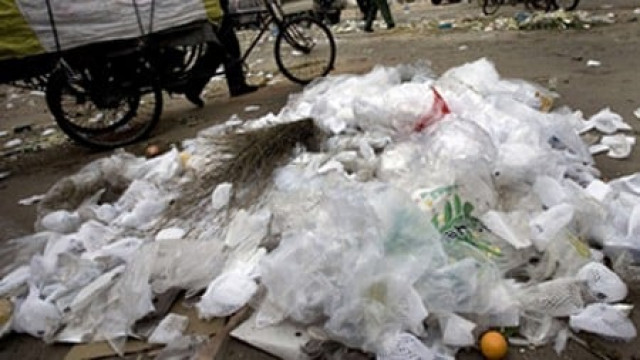Non-degradable products: Plastic bags posing environmental hazards
EPA fails to enforce regulation on manufacture, sale and use of plastic products.

Regular plastic bags are not biodegradable. PHOTO: AFP
On April 1, 2013, the Pakistan Environment Protection Agency (Pak-EPA) notified a regulation prohibiting manufacture, import, sale and use of non-degradable plastic products and other plastic materials in the country, including in the limits of the Islamabad Capital Territory (ICT), but due to a weak enforcement mechanism, its sale and use is consistently on the rise across the country.
“The current regulation needs amendment to address concerns of manufacturers and traders as current rules have been formulated to please only one company involved in the import and manufacture of degradable plastic products,” an official at the Pak-EPA told The Express Tribune on the condition of anonymity.
“There is discrimination in the current regulation which is in favour of a few companies to keep their monopoly in the market” he said.
On paper, the regulation aims to control the increasing production and use of non-degradable plastic materials and to enable exporters to comply with environment-friendly packaging demanded in the international market, but on grounds, it is almost non-implemented, as companies continue to manufacture and sell plastic products across the country, including Islamabad.
Many countries in Asia, Europe and the US have controlled plastic waste by introducing Oxo biodegradable plastic technology.
“The technology is simple which neither needs alteration of machinery nor process: a small Olefin-based additive is mixed with raw material (granules) to develop biodegradable properties in plastic and bags made with this technology. If left in the open air or in water, it gradually weakens and vanishes leaving behind humus (a non-toxic product),” the EPA official said.
“If the use of non-degradable plastic products continued at the current pace, it will play havoc with the environment and poor waste collection system in the country.”
According to a study conducted by the EPA in 2004, 55 billion bags are manufactured and consumed in the country annually with an annual growth rate of 15 per cent. The annual average consumption of plastic bags was estimated at 397 bags per person.
The report said that more than 8,000 plastic bag units were operating in different parts of the country — 6,000 in Lahore, 1,200 in Karachi, 300 in Peshawar and 230 in Faisalabad. According to the report, about 200,000 people directly and 600,000 people indirectly were associated with the business.
A few years back, when the Climate Change Division launched a campaign “say no to plastic bags” — aiming at reducing usage of plastic bags and discourage habit of using excessive quantity of plastic bags — large stores in the country introduced cotton and paper bags. The drive, however, could not continue for long.
The defunct ministry of environment after a series of meetings with plastic manufacturers and exporters also introduced the Oxo biodegradable bag technology and to promote the technology, Pak-EPA also held workshops.
Due to these efforts, a few companies have introduced biodegradable shopping bags, however, there is no mechanism to test these samples about their being environmental-friendly.
Published in The Express Tribune, January 27th, 2015.



















COMMENTS
Comments are moderated and generally will be posted if they are on-topic and not abusive.
For more information, please see our Comments FAQ